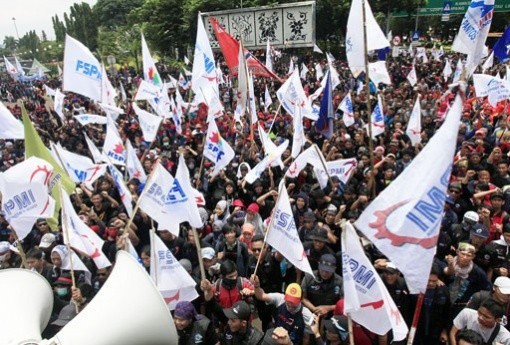Popular Reads
Top Results
Can't find what you're looking for?
View all search resultsPopular Reads
Top Results
Can't find what you're looking for?
View all search resultsProtecting workers’ savings
BPJS Ketenagakerjaan reported that claims on retirement savings increased from 2.2 million in 2019 to 2.5 million in 2020 as a result of the sharp rise in layoffs caused by the COVID-19 pandemic.
Change text size
Gift Premium Articles
to Anyone
T
rade union leaders would not have reacted so emotionally to the new labor minister’s regulation on the new procedures for claiming old-age pension or retirement savings from the Workers Social Security Agency (BPJS Ketenagakerjaan), had the new rules been vigorously deliberated under the tripartite mechanism of government, employers and trade unions.
The blunt fact is the requirements for claiming retirement savings (JHT) needed to be revised after the introduction of unemployment benefits as the fifth component of the labor insurance scheme. The other four components being health, work-accident, retirement and life insurance.
The unemployment benefit, amounting to 45 percent of a worker’s monthly wage for the first three months and 25 percent for the next three months will come into force later this month under the 2020 Job Creation Law. The government has allocated Rp 6 trillion (US$428 million) for the initial capital for the scheme.
Under a 2015 regulation, workers who are laid off or those who resign from their work can claim their retirement savings from the BPJS Ketenagakerjaan within one month after leaving employment. If this was allowed to continue much longer, the financial sustainability of BPJS Ketenagakerjaan would be undermined given the imbalance in cash flows, threatening the savings of 36.5 million workers.
BPJS Ketenagakerjaan reported that claims on retirement savings increased from 2.2 million in 2019 to 2.5 million in 2020. Yet many of the claims were made by workers who resigned from their jobs at very young age ( less than 40 years old)..
The higher numbers of early claims will not only negate the meaning of the retirement (old-saving) savings but also will affect the BPJS Ketenagakerjaan’s ability to earn high returns from its investments because it cannot invest its premium income in long-term funds, which give higher returns than short-term investment instruments. The problem is that more than 68 percent of the BPJS Ketenagakerjaan’s total premium income of over Rp 73 trillion in 2020 was derived from retirement savings.
The new rule, which is scheduled to become effective in May will allow claims on retirement savings only after the worker is 56 years old, dies or is totally disabled. But the regulation allows special permits for workers who have worked more than 10 years to cash out 30 percent of their savings as long as the funds are used for mortgage financing. Under the new procedure, BPJS Ketenagakerjaan will be able to better manage the maturity of its investments.
We suggest that the government, employers and trade union leaders revisit the labor minister’s regulation with a cool head. What is at stake here is the fate the hundreds of trillions of rupiah in workers’ savings currently under BPJS Ketenagakerjaan management.
Workers naturally want better social security, but employers need reasonable and sustainable earnings, while the government wants a more conducive climate for investment because it is investment, and not the government, that creates jobs. Economic growth and job creation are common goals.
Hence the relations between the three parties are not a zero-sum game but are interdependent as businesses can remain profitable only if they take good care of their workers so they give their best. The government cannot grow the economy if employers and unions are constantly at loggerheads with each other.











